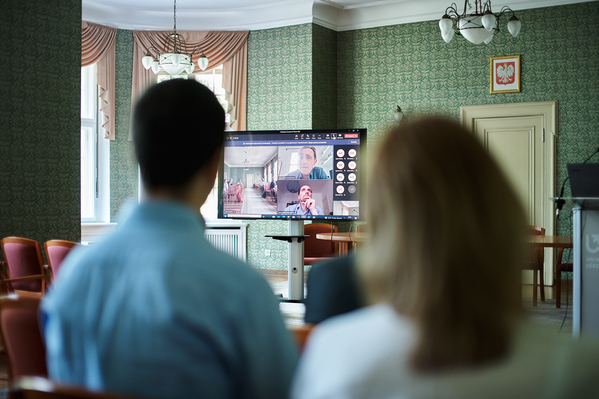The subject of the conference concerned the issues that the Ceraneum Centre deals with – broadly understood Byzantine-Slavic issues, history and culture of the Eastern Mediterranean area and traditions related to it.
After two years of conferences held in the remote (online) mode, the conference participants were able to meet again in the Alfred Biedermann’s Palace.

Photos from this year's edition of the symposium have been posted on the website of the Ceraneum Centre.
Thanks to the use of the hybrid formula, the University of Lodz hosted researchers from Bulgaria, Finland, Germany, Romania and the United Kingdom, and speakers, among others, from Austria, the Czech Republic, Spain, Ukraine and Italy, as well as from Egypt, Israel, Argentina, Mexico and the USA visited our university online.
Traditionally, the symposium was accompanied by plenary lectures delivered by eminent scholars specializing in research areas corresponding to the mainstream research conducted in the Ceraneum Centre.
As part of the panels devoted to the history of ancient and Byzantine medicine and culinary arts, the speakers were: dr Petros Bouras-Vallianatos (University of Edinburgh) and dr Alain Touwaide (The Institute for the Preservation of Medical Traditions).
Below, a recording made during the lecture delivered by Petros Bouras-Vallianatos - Byzantine medicine matters: current trends and future avenue. The podcast can also be found on Apple Podcasts and on UniLodz Soundcloud.
Dr Dirk Krasmüller (University of Vienna) was the special guest invited for those participants who explore issues in the field of Byzantine monasticism and spiritual culture of the Slavs.
Colloquia Ceranea IV (in accordance with the intention of the organisers) became a platform within which scientists, whose scientific activity is often interdisciplinary, had the opportunity to present their research results not only to a group of experts from their own research field, but also to representatives of other scientific disciplines.
This year's speeches, especially those delivered as part of thematic panels organised by:
- dr Sean Coughlin from the Czech Academy of Sciences (Experimental Approaches to the History of Perfumery in the Ancient Mediterranean)
- dr Erica Rowan (Voluntary Poverty: Food and Status in the Roman and Medieval Mediterranean) from Royal Holloway (University of London),
as well as papers by:
- dr Barbara Zipser (The Lexicography of Plant Names) from the Royal Holloway (University of London)
- dr Zofia Rzeźnicka and prof. dr hab. Maciej Kokoszko (Beef in the Byzantine Period: Dietetic Advice and Dietary Reality) from the University of Lodz
clearly confirmed how necessary, and at the same time how extremely effective, scientific cooperation between historians, classical philologists and specialists in the field of archaeobotany and archaeozoology is.
A panel devoted to Bogomilism was also interdisciplinary in nature. Deliberations moderated by dr Andrew R. Roach (University of Glasgow) took into account religious, historical, historiographic and literary studies perspectives.
Therefore, one of the main objectives of the symposium is a joint discussion of representatives of various scientific disciplines. The organisers of Colloquia Ceranea assume that the only way to properly understand either the assumptions of ancient and Byzantine medicine and culinary art, or Byzantine monasticism and spiritual culture of the Slavs is the mutual exchange of experiences, as well as the mutual use of research results from various areas of science.
Also, deliberations of the linguistic panel devoted to the future times in Slavic languages with the participation of a scholar from our university (dr Marek Majer), as well as researchers from the USA, Germany and Bulgaria seem particularly fruitful. They were accompanied by a lively discussion that continued long after closing of the meeting.
Ceraneum Centre was established in 2011 as a non-faculty interdisciplinary scientific and research unit of the University of Lodz, bringing together researchers from Poland and Europe dealing with broadly understood Byzantine-Slavic issues, history and culture of the Eastern Mediterranean area and traditions related to it. The Ceraneum Centre has a specialized collection of books in the field of Byzantine and Slavic studies. It also publishes Studia Ceranea, a periodical offering specialist studies, reviews and review notes of newly published monographs.
Source: Centrum Ceraneum
Edit: Promotion Centre of the University of Lodz
